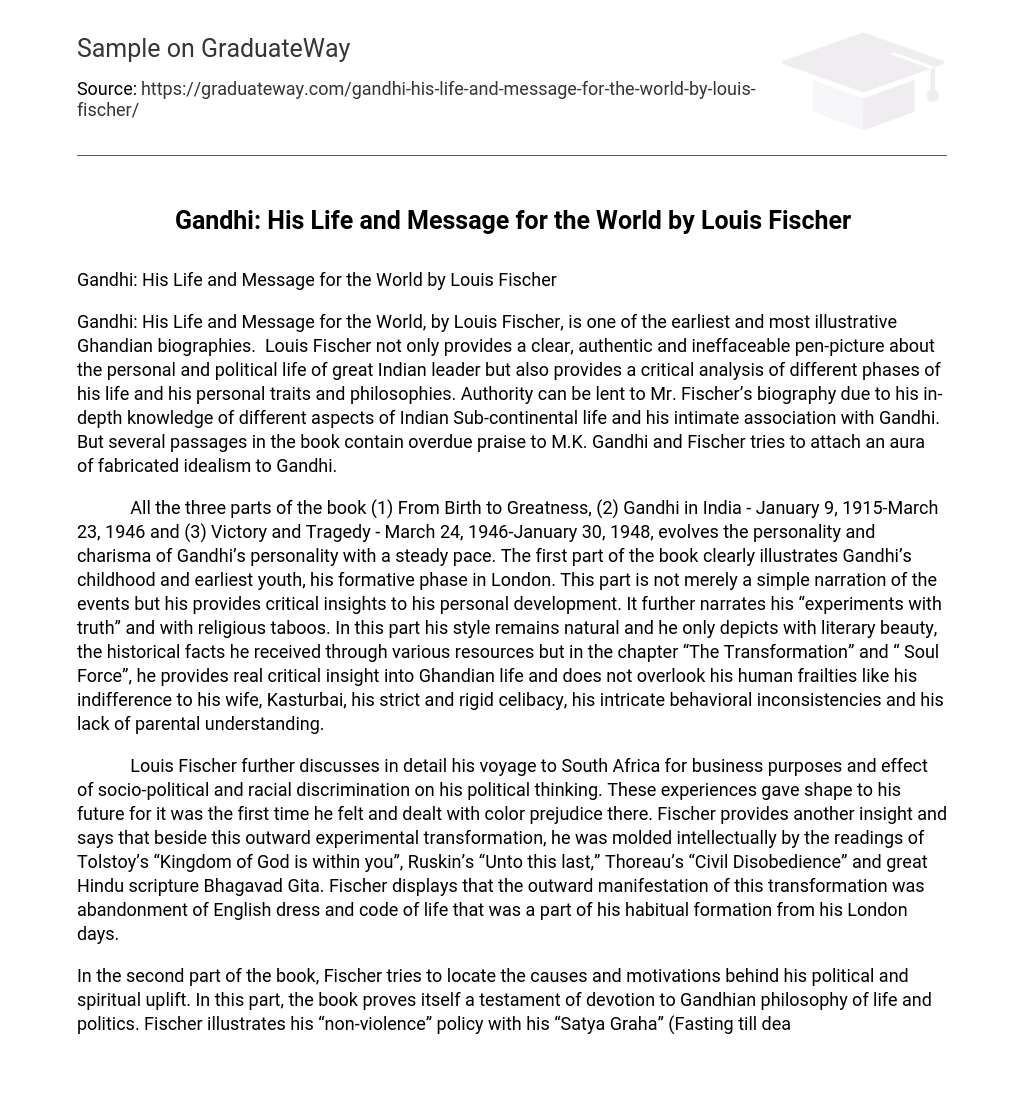Gandhi: His Life and Message for the World, by Louis Fischer, is one of the earliest and most illustrative Ghandian biographies. Louis Fischer not only provides a clear, authentic and ineffaceable pen-picture about the personal and political life of great Indian leader but also provides a critical analysis of different phases of his life and his personal traits and philosophies. Authority can be lent to Mr. Fischer’s biography due to his in-depth knowledge of different aspects of Indian Sub-continental life and his intimate association with Gandhi. But several passages in the book contain overdue praise to M.K. Gandhi and Fischer tries to attach an aura of fabricated idealism to Gandhi.
All the three parts of the book (1) From Birth to Greatness, (2) Gandhi in India – January 9, 1915-March 23, 1946 and (3) Victory and Tragedy – March 24, 1946-January 30, 1948, evolves the personality and charisma of Gandhi’s personality with a steady pace. The first part of the book clearly illustrates Gandhi’s childhood and earliest youth, his formative phase in London. This part is not merely a simple narration of the events but his provides critical insights to his personal development. It further narrates his “experiments with truth” and with religious taboos. In this part his style remains natural and he only depicts with literary beauty, the historical facts he received through various resources but in the chapter “The Transformation” and “ Soul Force”, he provides real critical insight into Ghandian life and does not overlook his human frailties like his indifference to his wife, Kasturbai, his strict and rigid celibacy, his intricate behavioral inconsistencies and his lack of parental understanding.
Louis Fischer further discusses in detail his voyage to South Africa for business purposes and effect of socio-political and racial discrimination on his political thinking. These experiences gave shape to his future for it was the first time he felt and dealt with color prejudice there. Fischer provides another insight and says that beside this outward experimental transformation, he was molded intellectually by the readings of Tolstoy’s “Kingdom of God is within you”, Ruskin’s “Unto this last,” Thoreau’s “Civil Disobedience” and great Hindu scripture Bhagavad Gita. Fischer displays that the outward manifestation of this transformation was abandonment of English dress and code of life that was a part of his habitual formation from his London days.
In the second part of the book, Fischer tries to locate the causes and motivations behind his political and spiritual uplift. In this part, the book proves itself a testament of devotion to Gandhian philosophy of life and politics. Fischer illustrates his “non-violence” policy with his “Satya Graha” (Fasting till death) with full of admiration. He extols this fasting as a measure of his non-violence policy but facts shows that this was always used as a political and tactical maneuver to deal with the British and force them to accept his proposals. The author depicts Gandhi’s fasting during Khilafat Movement as sign of solidarity to the Muslims but remains silent on the issue that why Gandhi ended his support for Khilafat Movement abruptly.
He further makes different comparisons of Gandhi with Christ, Churchill and Jinnah. Fischer’s stress is on the eulogy of Gandhi and his efforts to prove him an epitome of all-good for humanity. These comparisons seem appropriate but to a certain extent. For example in his comparison between Jinnah (the creator of Pakistan and its first Governor general and the man who is often blamed for division of India) and Gandhi, Fischer intentionally or unintentionally ignores the fact Jinnah was a statesman of stature and his political sagacity and resoluteness for his cause was praised by Gandhi himself. In addition to Gandhian life, Fischer’s portrayals of other giant Indian political personalities like Nehru, Vallabhbhai Patel and “Untouchable’s” leader Dr. Ambedlkar are brief but comprehensive.
The third part of the book again tries to erect Gandhi on a higher spiritual pedestal. In this section, Fischer not only reveals discriminating insights into Gandhi’s pathos and miseries during the division of India but it further illustrate an intimate view of those disturbed times. He is unable to relate any close affinity between tragic migration and bloody riots during division of India and creation of Pakistan with Gandhi’s policy of non-violence and why this policy of Gandhi failed here.
Although Gandhi: His Life and Message for the World is a historical account of Gandhi’s life but sometime it seems a personal tribute to great Gandhi and It covered all aspects of Gandhian life and his personal and political philosophy but it does not seem successful in its objectivity as Fischer sacrificed historical impartiality on the altar of personal attachment and admiration to Gandhi and his philosophy of life. But as a whole it is a well-balanced story of Gandhi from his childhood to death.
Reference
Fischer, Louis. (1954). Gandhi: His Life and Message for the World. New York: The New American Library of World Literature.





